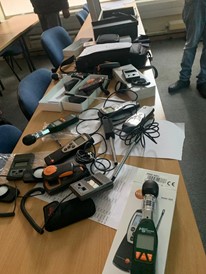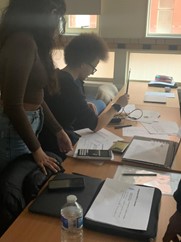As DMU transitions to block teaching, the ‘Sustainable Building Principles’ (BENV1301) module for 1st year students undertaking the BSc (Hons) Architectural Technology and BSc (Hons) Quantity Surveying and Construction programmes, provided a great research-led learning experience for students.
Overview
Dr Amal Abuzeinab and Dr Sahar Abdelwahab experimented with interconnected knowledge and skills approach to re-think the delivery of this module to reflect the new block teaching format. Amal and Sahar combined their research and research-led teaching expertise to lead and deliver relevant, current and real (RCR) learning experience. From Week 1, students were introduced to learning conditions focusing on three aspects: psychological safety; respect, and effective team working. These conditions were enforced throughout the block and evidence-based podcasts were added to the Learning Zone so students can re-visit these as modern professionals to be.
Collaboration
We involved collaborators from CLaSS, DMU sustainability team; and careers team to deliver customised sessions including academic integrity and writing; Carbon Literacy Training; and sustainability careers. Week 6 followed a micro-conference format covering modern careers by inviting 3 DMU graduates to share their experiences and to inspire Year 1 students.
Reflection as a learning tool
To embed reflection as a learning tool in this module, we asked students to use PERMA from positive psychology. Your PERMA, Your Way!
- Positive emotions – reflect on the 3 most frequent emotions you associate with the learning from this module, you can think about knowledge and skills
- Engagement – how you engage with this module? What was difficult and how did you continue to learn?
- Relationships – how did you build relationships with your peers, tutors, and invited tutors/ guests?
- Mattering – what knowledge and skills mattered to you in this module?
- Achievements – reflect on all the achievements you have gained through this module.
Indoor Environmental Comfort
Sahar led a series of workshops on Indoor Environmental Comfort. She incorporated interactive learning tools of indoor measurements using instruments as well as interactive online interfaces for building modelling and simulation. Because individuals perceive comfort and discomfort in buildings differently due to subjective factors, a timely survey was incorporated into the workshop, allowing students to investigate and quantify both objective and subjective measurements of discomfort. This exploration aims to comprehend how these perceptions are shaped not only by the climate and the building itself but also by the characteristics of the occupants.
Here are the activities that unfolded in the workshop:
- Indoor measurements: Engaging workshops were the cornerstone, where we got hands-on experience with indoor measurements using cutting-edge instruments.
- Tech-Infused Learning: The workshop seamlessly integrated interactive online interfaces for building modelling and simulation such as #CBE, #SunCalc and #ROOM
- Beyond Physical Environment: Because individuals perceive comfort and discomfort in buildings differently due to subjective factors, a right now survey was incorporated into the workshop, allowing students to investigate subjective perception of discomfort.
- Data Analysis and Evaluation: We used observations and descriptive analysis to develop the analytical skills to make informed decisions in real-world scenarios.
- Linking to Standards: We delved into building standards and rating systems, understanding how our insights align with and contribute to creating spaces that meet established benchmarks for environmental comfort.
Students feedback sample
“I used sustainability principles in real life.”
“Varied learning styles including group work.”
“I understand the difference between knowledge and skills sessions.”
“Carbon literacy helped me to understand climate change.”
Acknowledgment
We thank you Dr Luis Fernando Zapata Montalvo the programme leader for Architecture technology for creating clear and consistent module templates to be used by all module leaders.
Relevant publications
Awuzie, B.O.; Abuzeinab, A. (forthcoming) Understanding the Moderating Effect of Governance Functions on the Impact of Communication on Sustainability Implementation Performance in Higher Education Institutions in ‘Sustainability in higher education: Strategies, performance and future challenges’
Awuzie, B.O.; Abuzeinab, A. (2019) Modelling Organisational Factors Influencing Sustainable Development Implementation Performance in Higher Education Institutions: An Interpretative Structural Modelling (ISM) Approach. Sustainability, 11, 4312
Abdelwahab, S., & Sobh, H. (2022). Visual Discomfort Analysis as a Tool to Support Façade Shading Design: A Case Study in the Architectural Design Studio. Journal of Architectural Engineering, 28(2), 05022003.
Abdelwahab, S., Rutherford, P., Mayhoub, M., & Altomonte, S. (2019). Sensitivity Analysis on the Impact of User Control on Daylight and Energy Simulations. In IBPSA-Building Simulation 2019 International Conference.
Abdelwahab, S., Elhussainy, M., & Labib, R. (2019). The Negative Impact of Solar Reflections Caused by Reflective Buildings’ Facades: Case Study of the Nasher Museum in Texas. In IOP Conference Series: Earth and Environmental Science (Vol. 297, No. 1, p. 012048). IOP Publishing.

